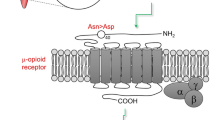Abstract
Background
Single nucleotide polymorphisms (SNPs) in UGT2B7 C802T and CYP3A4*1G impact drug metabolism. This study aimed to investigate the impact of these SNPs on the efficacy of oxycontin for pain relief in cancer patients.
Methods
A total of 57 Han Chinese cancer patients (age range 20–70 years) who received oxycontin to ease pain for the first time were enrolled and divided into two groups (refractory group and remission group) according to pain relief. Peripheral blood samples were collected from each patient for sequencing analysis. The genotype and allele frequency between the two groups were analyzed using the chi-square test.
Results
The T allele frequency of UGT2B7 C802T was 25% among all participants, but was higher (32%) in the refractory group (P = 0.047). The variant allele frequency of CYP3A4*1G was 27% and did not differ between the refractory group and remission group.
Conclusion
The palliative effect of oxycontin is better in patients with UGT2B7 802CC than in those with 802TT. CYP3A4*1G SNP is unlikely to affect pain relief efficacy of oxycontin.

Similar content being viewed by others
References
Shi Q, Cleeland CS, Klepstad P, Miaskowski C, Pedersen NL (2010) Biological pathways and genetic variables involved in pain. Qual Life Res 19:1407–1417
Maeda K, Sugiyama Y (2008) Impact of genetic polymorphisms of transporters on the pharmacokinetic, pharmacodynamic and toxicological properties of anionic drugs. Drug Metab Pharmacokinet 23:223–235
King CD, Rios GR, Green MD, Tephly TR (2000) UDP-glucuronosyltransferases. Curr Drug Metab 1:143–161
Coffman BL, Rios GR, King CD, Tephly TR (1997) Human UGT2B7 catalyzes morphine glucuronidation. Drug Metab Dispos 25:1–4
Yoo HD, Lee YB (2011) Interplay of pharmacogenetic variations in ABCB1 transporters and cytochrome P450 enzymes. Arch Pharm Res 34:1817–1828
Gronlund J, Saari TI, Hagelberg NM, Neuvonen PJ, Laine K, Olkkola KT (2011) Effect of inhibition of cytochrome P450 enzymes 2D6 and 3A4 on the pharmacokinetics of intravenous oxycodone: a randomized, three-phase, crossover, placebo-controlled study. Clin Drug Investig 31:143–153
Fukushima-Uesaka H, Saito Y, Watanabe H, Shiseki K, Saeki M, Nakamura T, Kurose K, Sai K, Komamura K, Ueno K, Kamakura S, Kitakaze M, Hanai S, Nakajima T, Matsumoto K, Saito H, Goto YI, Kimura H, Katoh M, Sugai K, Minami N, Shirao K, Tamura T, Yamamoto N, Minami H, Ohtsu A, Yoshida T, Saijo N, Kitamura Y, Kamatani N, Ozawa S, Sawada JI (2004) Haplotypes of CYP3A4 and their close linkage with CYP3A5 haplotypes in a Japanese population. Hum Mutat 23:100
Lauretti GR, Oliveira GM, Pereira NL (2003) Comparison of sustained-release morphine with sustained-release oxycodone in advanced cancer patients. Br J Cancer 89:2027–2030
Somogyi AA, Barratt DT, Coller JK (2007) Pharmacogenetics of opioids. Clin Pharmacol Ther 81:429–444
Campa D, Gioia A, Tomei A, Poli P, Barale R (2008) Association of ABCB1/MDR1 and OPRM1 gene polymorphisms with morphine pain relief. Clin Pharmacol Ther 83:559–566
Fujita K, Ando Y, Yamamoto W, Miya T, Endo H, Sunakawa Y, Araki K, Kodama K, Nagashima F, Ichikawa W, Narabayashi M, Akiyama Y, Kawara K, Shiomi M, Ogata H, Iwasa H, Okazaki Y, Hirose T, Sasaki Y (2010) Association of UGT2B7 and ABCB1 genotypes with morphine-induced adverse drug reactions in Japanese patients with cancer. Cancer Chemother Pharmacol 65:251–258
Lalovic B, Kharasch E, Hoffer C, Risler L, Liu-Chen LY, Shen DD (2006) Pharmacokinetics and pharmacodynamics of oral oxycodone in healthy human subjects: role of circulating active metabolites. Clin Pharmacol Ther 79:461–479
Kummer O, Hammann F, Moser C, Schaller O, Drewe J, Krahenbuhl S (2011a) Effect of the inhibition of CYP3A4 or CYP2D6 on the pharmacokinetics and pharmacodynamics of oxycodone. Eur J Clin Pharmacol 67:63–71
Zhang W, Chang YZ, Kan QC, Zhang LR, Li ZS, Lu H, Wang ZY, Chu QJ, Zhang J (2010) CYP3A4*1G genetic polymorphism influences CYP3A activity and response to fentanyl in Chinese gynecologic patients. Eur J Clin Pharmacol 66:61–66
Du J, Zhang A, Wang L, Xuan J, Yu L, Che R et al (2010) Relationship between response to risperidone, plasma concentrations of risperidone and CYP3A4 polymorphisms in schizophrenia patients. J Psychopharmacol 24:1115–1120
Acknowledgements
This study was funded by the grant of the new technology and business of Tongji Hospital.
Author information
Authors and Affiliations
Corresponding author
Ethics declarations
The study was approved by the Ethical Committee of Tongji Hospital. All written informed consent documents were obtained from each participant before the study.
Conflict of interest
The authors declare that they have no conflict of interest.
Rights and permissions
About this article
Cite this article
Li, J., Peng, P., Mei, Q. et al. The impact of UGT2B7 C802T and CYP3A4*1G polymorphisms on pain relief in cancer patients receiving oxycontin. Support Care Cancer 26, 2763–2767 (2018). https://doi.org/10.1007/s00520-018-4130-4
Received:
Accepted:
Published:
Issue Date:
DOI: https://doi.org/10.1007/s00520-018-4130-4




